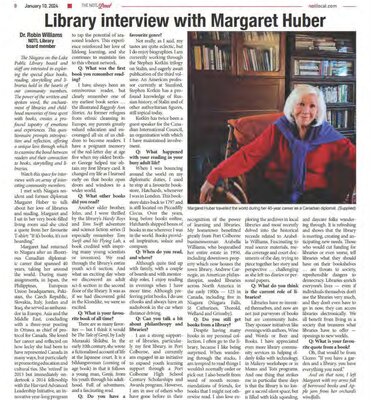Library interview with Margaret Huber
Dr. Robin Williams
NOTL Library board member
The Niagara-on-the-Lake Public Library board and staff are interested in exploring the special place books, reading, storytelling and libraries hold in the hearts of our community members. The power of the written and spoken word, the enchantment of libraries and childhood memories of time spent with books, creates a profound tapestry of emotions and experiences. This questionnaire prompts introspection and reflection, offering a unique lens through which to examine the bond between readers and their connection to books, storytelling and libraries. Watch this space for interviews with an array of interesting community members.
I met with Niagara resident and former diplomat Margaret Huber to talk about her love of libraries and reading. Margaret and I sat in her very book-filled living room and she cited a quote from her favourite T-shirt: “If it’s books, it’s not hoarding.” Margaret had returned to Niagara after an illustrious Canadian diplomatic career that spanned 40 years, taking her around the world. During many assignments, in Japan, the Philippines, European Union headquarters, Pakistan, the Czech Republic, Slovakia, Italy, Jordan and Iraq, she served as ambassador in Europe, Asia and the Middle East, concluding with a three-year posting in Ottawa as chief of protocol for Canada. She loved her career and reflected on how lucky she had been to have represented Canada in many ways, but particularly in promoting education and cultural ties. She ‘retired’ in 2013 but immediately undertook a 2014 fellowship with the Harvard Advanced Leadership Initiative, an innovative year-long program to tap the potential of seasoned leaders. This experience reinforced her love of lifelong learning, and she continues to maintain ties to this vibrant network.
Q: What was the first book you remember reading? I have always been an omnivorous reader, but clearly remember one of my earliest book series … the illustrated Raggedy Ann Stories. As former refugees from ethnic cleansing in Europe, my parents greatly valued education and encouraged all six of us children to become readers. I have a poignant memory of the red-letter day at age five when my oldest brother George helped me obtain my first library card. It changed my life as I learned early on that books open doors and windows to a wider world.
Q: What other books did you read? Another older brother, John, and I were thrilled by the library’s Hardy Boys and Tom Swift adventure and science fiction series (I especially remember Tom Swift and his Flying Lab, a book credited with inspiring many young scientists or inventors). We read through the library’s entire youth sci-fi section. And what an exciting day when we discovered an adult sci-fi section in the second floor of the library. It was as if we had discovered gold in the Klondike, we were so excited.
Q: What is your favourite book of all time? There are so many favorites — but I think it would be The Tale of Genji, by Lady Murasaki Shikibu. In the early 10th century, she wrote a fictionalized account of life at the Japanese court. It is a bildungsroman (coming of age book) in that it follows a young man, Genji, from his youth through his adulthood. Full of adventures, and a fascinating read.
Q: Do you have a favourite genre? Not really, as I said, my tastes are quite eclectic, but I do enjoy biographies. I am currently working through the Stephen Kotkin trilogy on Stalin, and eagerly await publication of the third volume. An American professor currently at Stanford, Stephen Kotkin has a profound knowledge of Russian history, of Stalin and of other authoritarian figures, still topical today. Kotkin has twice been a guest speaker for the Canadian International Council, an organization with which I have maintained involvement.
Q: What happened with your reading in your busy adult life? When I was bouncing around the world on my diplomatic duties, I used to stop at a favourite bookstore, Hatchards, whenever I was in London. This bookstore dates back to 1797 and is still located on Piccadilly Circus. Over the years, long before books online, Hatchards shipped boxes of books to me wherever I was in the world. Books provided inspiration, solace and company.
Q: When do you read, and where? Although quite tied up with family, with a couple of boards and with mentorship roles, I enjoy reading in evenings when I have more time. Although preferring print books, I do use eBooks and always have an audiobook in the car when distance driving
Q: Can you talk a bit about philanthropy and libraries? I am a strong supporter of libraries, particularly my first library, in Port Colborne, and currently am engaged in an initiative to expand youth learning support through a Port Colborne High School Century Scholarships and Awards program. However, I am in awe of others who have gone before in their recognition of the power of learning and libraries. My hometown benefitted greatly from Port Colborne businesswoman Arabella Williams, who bequeathed her entire estate in 1950, including downtown property which now houses the town library. Andrew Carnegie, an American philanthropist, seeded libraries across North America in the early 1900s — 125 in Canada, including five in Niagara (Niagara Falls, St Catharines, Thorold, Welland and Grimsby).
Q: Do you still get books from a library? Despite having many books in my personal collection, I often go to the library, because I like being surprised. When wandering through the stacks, I am tempted to read things I wouldn’t normally order or pick out. I also benefit from word of mouth recommendations of friends, for books that I might not otherwise read. I also love exploring the archives in local libraries and most recently delved into the historical records related to Arabella Williams. Fascinating to read source materials, media coverage and court documents of the day, trying to piece together her story and perspective … challenging as she left no diaries or personal papers.
Q: What do you think is the current role of libraries? Libraries have re-invented themselves, and now are not just purveyors of books but are community hubs. They sponsor initiatives like evenings with authors, Wine and Words or Beer and Books. I have appreciated even more library community services in helping elderly folks with technology, in Makery workshops or in Moms and Tots programs. And one thing that strikes me in particular these days is that the library is no longer a sacred silent space, but is filled with kids squealing, and daycare folks wandering through. It is refreshing and shows that the library is meeting, creating and anticipating new needs. Those who would cut funding for libraries or even worse, tell libraries what they should have on their bookshelves … are threats to society, reprehensible dangers to democracy. Libraries enrich everyone’s lives — even if individuals themselves don’t use the libraries very much, and they don’t even have to go in now, they can access libraries electronically. We all benefit from living in a society that treasures what libraries have to offer — openings to new worlds.
Q: What is your favourite quote from a book? Oh, that would be from Cicero: “If you have a garden and a library, you have everything you need.” And on that note, I left Margaret with my arms full of borrowed books and Apple jam from her orchard’s windfalls.




